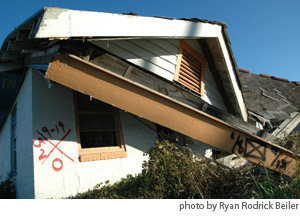 I have always felt a bit disconnected from Hurricane Katrina – I was on vacation a half a world away when the storm devastated the Gulf Coast. Cut off from television and the internet, I was not saturated with the images of people on roofs, empty buses parked in rows, flooded and flattened buildings, and mile after mile of debris. I missed those initial days of around-the-clock coverage, and I did not share in what I assume was the national incredulity at the fact that these images beamed into American homes were taken on our own soil, not some third world backwater. Where I was, I only managed to glean some patchy reports that left me with similar bewilderment – something about New Orleans underwater and the Superdome destroyed. I returned home to a nation in shock, like walking into a theater during the closing credits after that fatal twist at the end no one was expecting.
I have always felt a bit disconnected from Hurricane Katrina – I was on vacation a half a world away when the storm devastated the Gulf Coast. Cut off from television and the internet, I was not saturated with the images of people on roofs, empty buses parked in rows, flooded and flattened buildings, and mile after mile of debris. I missed those initial days of around-the-clock coverage, and I did not share in what I assume was the national incredulity at the fact that these images beamed into American homes were taken on our own soil, not some third world backwater. Where I was, I only managed to glean some patchy reports that left me with similar bewilderment – something about New Orleans underwater and the Superdome destroyed. I returned home to a nation in shock, like walking into a theater during the closing credits after that fatal twist at the end no one was expecting.
Traveling to the Gulf Coast for a visit to New Orleans and a week of rebuilding work in Mississippi last week changed all of that for me. Like Thomas touching Christ’s hands and side, I joined thousands of volunteers before me in seeing for myself. I saw the empty lots where houses, churches, and businesses once stood. I heard people’s stories of survival during the storm, and I stood alongside them for this one moment in time as they continue to rebuild their homes and their lives.
There are some successes in this whole tale, and we need those silver linings amidst such devastation and despair. Thousands of people and millions of dollars have made their way to the area from the private and nonprofit sectors, and each week those people and dollars bring small but perceptible changes. Our group sanded, spackled, painted and floored, leaving three houses a bit closer to completion than when we arrived. And encouragingly, the mission that hosted us is booked with volunteers until the end of 2008. Indeed, the faith and charitable communities have responded.
But being there, it is clear that this is a marathon, not a sprint. Estimates are that rebuilding will take another 5-10 years. Despite that forecast, some groups and denominations are beginning to pull out as we pass the year and a half mark, and both public and private money for some services is drying up. For example, funding is ending for some mental health support services, so local radio ads encouraged people – soon to be left without professional support – to make use of these services while they can. Some of the free meal programs – for both residents and volunteers – are scaling back. And even though some FEMA trailers are just arriving, local advocates must continually fight for extensions to keep them so that the many whose homes are not yet ready have roofs over their heads in the interim. This is not to mention the fierce local battles occurring over issues like affordable housing policy, development practices, and insurance and government reparations (or the lack thereof).
When we debriefed our trip on the last night, our host organization urged us to come back and continue to tell the story of the Gulf Coast. Just as God calls His people to be a people of remembrance, we must not let our nation or our churches forget that there are those on our own shore – fellow Americans – who need their walls rebuilt, and that it is the work of years, not months. The breach is not yet repaired.
Bob Francis is the Policy and Organizing Assistant for Sojourners/Call to Renewal. He traveled to Biloxi, Mississippi, in support of the United Church of Christ’s Back Bay Mission with five fellow staff members in partnership with a work team from Pilgrim UCC of Wheaton, Maryland.
+ See multimedia from Sojourners/Call to Renewal’s first Gulf Coast work project in July 2006

